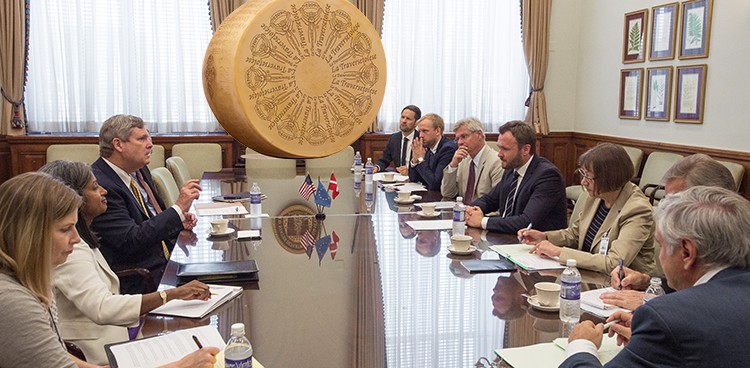
The Transatlantic Trade and Investment Partnership, better known as TTIP (as opposed to the Trans-Pacific Partnership, or TPP), may have found an odd sticking point in negotiations. When it comes to automobiles or drugs, the countries at the table are willing to deal, but when the conversation switches to food, world leaders smile uncomfortably and refuse to budge. The problem? In a word, cheese.
The divergence in attitudes is not unfamiliar. Cheese authenticity still gets many riled up across the pond, which seems elitist or Euro-centric to Americans. Safety is more on the minds of American consumers, which seems overly prudish to European cheesemongers.
Let’s break down the issue. The first stumbling block is the wonderful and frustrating world of PDO cheese. PDO (protected destination of origin) is an EU umbrella term to refer to products that must be produced in a specific location. Examples include Parmigiano Reggiano or Imokilly Regato. PDO preserves authenticity in products, and it allows localism to exist in an increasingly globalized world.
However, it has been a point of international tension historically. President Obama’s second inaugural dinner raised some eyebrows over his use of Champagne that didn’t come from, well, Champagne. Cheeses like Havarti or Feta, while general categories in America, refer in Europe to cheeses exclusively from Denmark or Greece. TTIP now has to reconcile whether or not generic American Havarti can be sold in Denmark, where anybody can tell you that only they are allowed to make Havarti. Americans counter that authentic practice is more important than place. Children of immigrants, who learned cheesemaking from their parents and grandparents, have every right to keep making that cheese. They might also point to academic articles that suggest that cheesemaking bacteria are not unique to specific places.
The other issue is safety. European cheesemakers are frustrated by arbitrary American rules, like the interdiction of the mite cheese mimolette for no good reason apart from general mite-phobia. Americans also insist on having their own inspectors on hand in Europe, which other countries find frustrating and humiliating. Americans counter that Europeans’ anti-GMO fervor is equally obtuse, and their standards for beef are scientifically baseless.
What all this boils down to is taste. Americans have their own predilections for cheese, which often run counter to those of Europeans. This applies equally to how and where cheese is made as to food safety. Food is cultural and thus carries more emotional weight than other commodities. For now, negotiators might benefit from a multi-cultural cheese plate, perhaps with some good wine to diffuse some of the tension in the room.
Feature Photo Credit: 20140708-OSEC-LSC-0001 by U.S Department of Agriculture | CC



